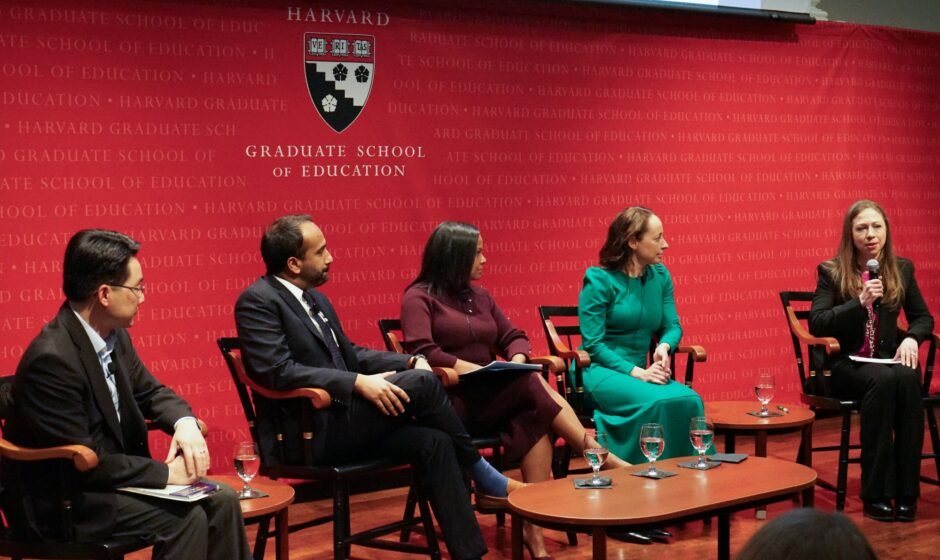A group of early childhood health experts gathered at a Harvard Graduate School of Education forum to discuss the impact of climate change on childhood development. The event, titled “A Healthy Childhood in a Changing Climate,” aimed to address potential solutions to mitigate the effects of climate change on children’s health and development. Chelsea V. Clinton, vice chair of the Clinton Foundation, moderated the discussion.
The forum began with HGSE Dean Bridget Terry Long emphasizing the urgency of responding to climate change. Long highlighted the immediate risks posed by wildfires, extreme heat, air pollution, and flooding to the social and academic development of children. According to Long, climate change is not a future challenge but a present reality.
Clinton emphasized the need for adults to take responsibility for climate change instead of burdening future generations. She expressed the importance of allowing children to have a normal childhood, filled with school, outdoor play, and a sense of wonder. Clinton urged accountability for failing to provide these experiences for today’s youth.
Lindsey C. Burghardt, chief science officer at Harvard’s Center for the Developing Child, discussed the specific challenges faced by children with conditions such as asthma or allergies due to climate change. Burghardt shared her own experience as a pediatrician and mother, recounting how her son struggled to focus at school due to excessive heat in the classroom. This realization made her understand the profound impact of climate change on a child’s environment and development.
Gaurab Basu, director of education and policy at the Harvard School of Public Health’s Center for Climate, Health, and the Global Environment, emphasized the importance of prioritizing human health. Basu advocated for procedures that promote caring for one another as a way to ensure people’s well-being. He suggested improvements in infrastructure, such as heat pumps and green playgrounds, to alleviate climate-related distress in schools. Basu highlighted the negative effects of extreme heat on children’s mental health, behavior, sleep patterns, and reproductive health.
Leah Austin, the president and CEO of the National Black Child Development Institute, discussed the behavioral concerns caused by climate change in students. Austin explained that poorly ventilated classrooms with extreme heat can lead to increased irritation or aggression in students, resulting in disciplinary actions and setbacks in their academic experiences. She emphasized the need to address the discrepancies and inequities that affect Black children, which are often overlooked.
Junlei Li, a Senior Lecturer at HGSE, suggested that addressing climate change should be driven by a childlike sense of wonder about the world. Li encouraged actions and care inspired not only by the sense of risk and threat but also by the curiosity and exploration that children possess.
Basu acknowledged that the impact of climate change can be disorienting but expressed confidence in humanity’s ability to combat its effects. He stated that society has the necessary tools to tackle climate change head-on, but action should have been taken much earlier.
Li called for policymakers to provide more support for families, educators, and care providers, emphasizing that lasting impact on children cannot be achieved without addressing the needs of the adults involved.
In closing, Clinton urged everyone to take action and involve children in the decision-making process. She encouraged parents to bring their kids when they vote so that they can understand the connection between their concerns, such as climate, education, and health, and the choices made at the ballot box.
This article was written by Katie B. Tian and originally published in The Harvard Crimson.




